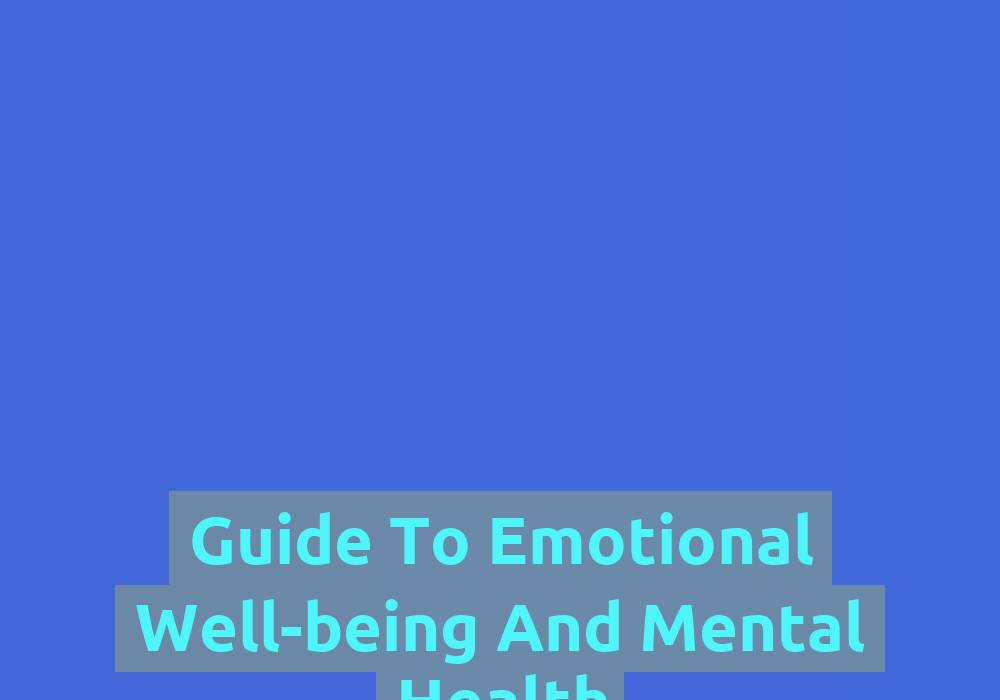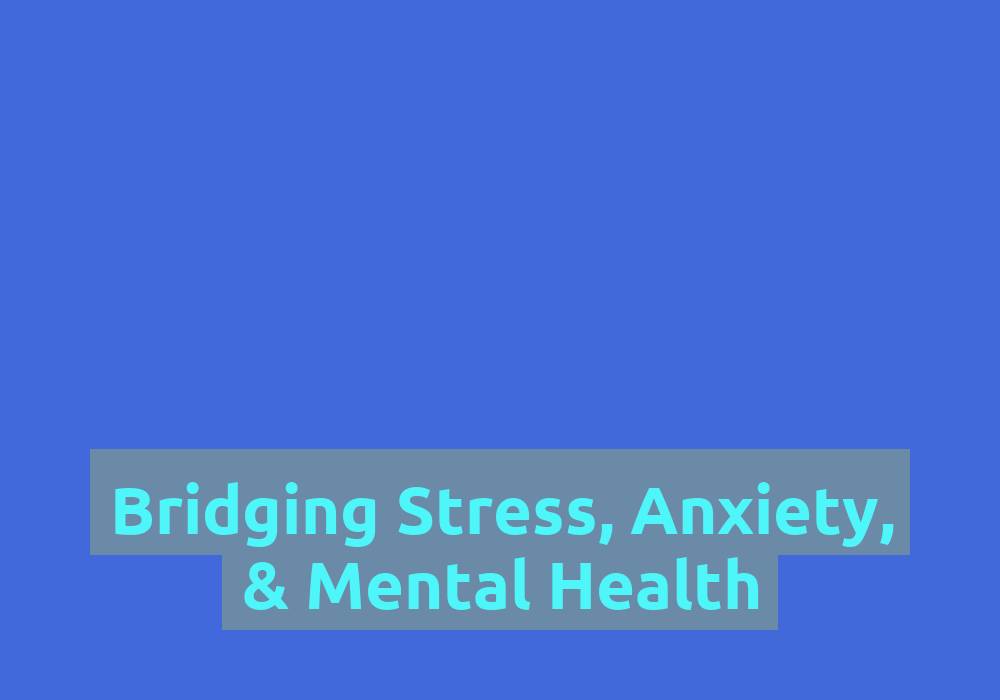Boost Mental Health Through Cognitive Fitness

In today’s fast-paced world, where stress and anxiety have become dominant factors in our daily lives, it is crucial to prioritize mental health. One effective way to enhance mental well-being is through cognitive fitness. Cognitive fitness refers to the state of optimal brain health and function, which can be achieved through various exercises and activities. In this article, we will explore how cognitive fitness can contribute to boosting mental health and provide practical tips to incorporate it into your daily routine.
Understanding Cognitive Fitness
Cognitive fitness encompasses a range of mental processes, including memory, attention, problem-solving, and reasoning. It involves maintaining and improving these cognitive abilities, which can significantly impact our mental well-being and overall quality of life. Just like physical fitness enhances our physical health, cognitive fitness nurtures our mental capacity.
Expanding on this, let’s delve deeper into the different aspects of cognitive fitness:
-
Memory: Memory is a crucial cognitive ability that allows us to retain and retrieve information. Engaging in cognitive fitness exercises can improve memory retention and recall abilities. This is particularly beneficial for individuals experiencing age-related cognitive decline or struggling with memory-related conditions such as Alzheimer’s disease. Some activities that can enhance memory include puzzles, memory games, and mnemonic techniques like visualization and association.
-
Attention: Attention refers to our ability to focus on a specific task or stimuli. Regular cognitive exercises sharpen our ability to focus and concentrate, allowing us to stay present and attentive in various aspects of life. This improves productivity, academic performance, and overall cognitive efficiency. Mindfulness practices, such as meditation and deep breathing, can help improve attention and focus by training the mind to stay in the present moment.
-
Problem-Solving and Reasoning: Cognitive fitness also encompasses problem-solving and reasoning skills. These abilities enable us to analyze situations, make decisions, and find effective solutions. Building cognitive fitness helps develop mental resilience by strengthening our problem-solving and decision-making skills. This enables us to adapt better to challenging situations, cope with stress, and make sound judgments. Brain-training games and puzzles, such as Sudoku or crosswords, can help improve problem-solving and reasoning abilities.
Benefits of Cognitive Fitness on Mental Health
Now that we have a better understanding of cognitive fitness, let’s explore the specific benefits it offers for mental health:
-
Improved Memory: Engaging in cognitive fitness exercises not only helps maintain memory but also enhances memory retention and recall abilities. This is particularly beneficial for individuals experiencing age-related cognitive decline or struggling with memory-related conditions such as Alzheimer’s disease. By incorporating memory-enhancing activities into our daily routine, such as puzzles, memory games, and mnemonic techniques, we can boost our memory capacity.
-
Enhanced Focus and Attention: Regular cognitive exercises sharpen our ability to focus and concentrate, allowing us to stay present and attentive in various aspects of life. This improves productivity, academic performance, and overall cognitive efficiency. Mindfulness practices, such as meditation and deep breathing, can help improve attention and focus by training the mind to stay in the present moment. Additionally, techniques like time management and minimizing distractions can further enhance our focus and attention span.
-
Increased Mental Resilience: Building cognitive fitness helps develop mental resilience by strengthening our problem-solving and decision-making skills. This enables us to adapt better to challenging situations, cope with stress, and make sound judgments. Engaging in activities that require critical thinking, such as brain-training games and puzzles, can boost our mental resilience. Additionally, practicing resilience in everyday life by reframing negative thoughts, seeking support from loved ones, and cultivating a positive mindset can further enhance our mental resilience.
-
Stress Reduction: Cognitive fitness exercises, such as mindfulness meditation and breathing techniques, have been proven to reduce stress and anxiety levels. By focusing on the present moment and cultivating a non-judgmental awareness, individuals can find relief from their worries and achieve a sense of calm. Incorporating mindfulness practices into our daily routine, even for a few minutes a day, can contribute to long-term stress reduction.
-
Prevention of Cognitive Decline: Engaging in cognitive fitness activities throughout life can potentially delay the onset of cognitive decline and neurodegenerative diseases. Studies have shown that a mentally stimulating lifestyle can reduce the risk of developing conditions like dementia. By challenging our brains through activities such as reading, learning new skills, and solving puzzles, we can promote brain health and reduce the risk of cognitive decline.
Expanding on these benefits, let’s explore additional details and strategies to incorporate cognitive fitness into our daily lives:
-
Improved Memory: Engaging in activities that require active recall, such as regularly practicing retrieval of information from memory rather than relying solely on notes or electronic devices, can strengthen memory. Additionally, incorporating mnemonic techniques, like creating vivid mental images or using acronyms, can enhance memory retention.
-
Enhanced Focus and Attention: Along with mindfulness practices, like meditation and deep breathing, it can be helpful to establish a distraction-free environment when engaging in tasks that require focus. Minimizing external distractions, such as turning off notifications on electronic devices or finding a quiet space, can improve concentration and attention.
-
Increased Mental Resilience: Developing problem-solving and decision-making skills can enhance mental resilience. Engaging in activities that require logical reasoning, such as solving puzzles or engaging in strategic games, can strengthen these skills. Additionally, practicing positive self-talk and reframing negative thoughts can contribute to mental resilience.
-
Stress Reduction: In addition to mindfulness meditation and breathing techniques, engaging in regular physical exercise, such as yoga or aerobic activities, can reduce stress levels. Physical activity releases endorphins, which are natural stress-relieving hormones. Creating a consistent sleep routine and prioritizing relaxation techniques, such as taking warm baths or listening to calming music, can also contribute to stress reduction.
-
Prevention of Cognitive Decline: Along with mentally stimulating activities, maintaining a healthy lifestyle is essential for preventing cognitive decline. A balanced diet, rich in fruits, vegetables, whole grains, and healthy fats like omega-3 fatty acids, supports brain health. Regular exercise, sufficient sleep, and social engagement also play key roles in maintaining cognitive function.
Practical Tips for Cognitive Fitness
Now that we understand the benefits of cognitive fitness, let’s explore practical tips to incorporate it into our daily routine:
-
Physical Exercise: Regular physical activity has been linked to improved cognitive function. Engage in activities such as brisk walking, jogging, or dancing to increase blood flow to the brain and stimulate neural connections. Aim for at least 150 minutes of moderate-intensity exercise or 75 minutes of vigorous-intensity exercise per week.
-
Brain-Training Games: There are various online platforms and mobile applications that offer brain-training games and puzzles. These games challenge memory, attention, and problem-solving skills, providing an enjoyable way to enhance cognitive fitness. Set aside dedicated time each day to engage in these activities.
-
Meditation and Mindfulness: Practice meditation and mindfulness techniques to improve focus and reduce stress. Start with short sessions and gradually increase the duration as you become more comfortable. Apps like Headspace and Calm can guide you through the process and provide structured meditation programs.
-
Reading and Learning: Stimulate your brain by reading books, articles, or engaging in online courses. This not only enhances knowledge but also exercises memory and cognitive abilities. Set aside time each day for reading and explore topics that interest you.
-
Social Engagement: Engaging in social activities, such as volunteering or joining clubs and organizations, promotes cognitive fitness. Interacting with others stimulates your brain by requiring social cognition and communication skills. Make an effort to connect with friends, family, or participate in community events.
-
Get Enough Sleep: Quality sleep is vital for cognitive function. Aim for 7-9 hours of uninterrupted sleep each night to allow your brain to recharge and consolidate memories. Establish a consistent sleep schedule and create a relaxing bedtime routine to improve sleep quality.
-
A Balanced Diet: Proper nutrition plays a significant role in cognitive fitness. Consume a diet rich in fruits, vegetables, whole grains, and healthy fats like omega-3 fatty acids, which have been linked to improved brain health. Avoid excessive consumption of processed foods and sugary drinks.
Conclusion
Prioritizing cognitive fitness is crucial for overall mental health and well-being. By incorporating various exercises and activities into our daily routine, we can enhance memory, focus, and problem-solving abilities while reducing stress and the risk of cognitive decline. Remember to engage in physical exercise, brain-training games, meditation, reading, social interaction, and prioritize sufficient sleep and a balanced diet. By investing in cognitive fitness, you are taking a proactive step towards a healthier mind and a brighter future.
Note: The content has been generated by OpenAI’s GPT-3 language model. While it strives to provide accurate and helpful information, it is essential to consult a certified professional or expert for specific advice and guidance in addressing mental health concerns.
The complete article is shown below in markdown format:
“`
In today’s fast-paced world, where stress and anxiety have become dominant factors in our daily lives, it is crucial to prioritize mental health. One effective way to enhance mental well-being is through cognitive fitness. Cognitive fitness refers to the state of optimal brain health and function, which can be achieved through various exercises and activities. In this article, we will explore how cognitive fitness can contribute to boosting mental health and provide practical tips to incorporate it into your daily routine.
Understanding Cognitive Fitness
Cognitive fitness encompasses a range of mental processes, including memory, attention, problem-solving, and reasoning. It involves maintaining and improving these cognitive abilities, which can significantly impact our mental well-being and overall quality of life. Just like physical fitness enhances our physical health, cognitive fitness nurtures our mental capacity.
Expanding on Cognitive Fitness
Cognitive fitness can be further understood by delving deeper into its different aspects:
-
Memory: Memory is a crucial cognitive ability that allows us to retain and retrieve information. Engaging in cognitive fitness exercises can improve memory retention and recall abilities. This is particularly beneficial for individuals experiencing age-related cognitive decline or struggling with memory-related conditions such as Alzheimer’s disease. Some activities that can enhance memory include puzzles, memory games, and mnemonic techniques like visualization and association.
-
Attention: Attention refers to our ability to focus on a specific task or stimuli. Regular cognitive exercises sharpen our ability to focus and concentrate, allowing us to stay present and attentive in various aspects of life. This improves productivity, academic performance, and overall cognitive efficiency. Mindfulness practices, such as meditation and deep breathing, can help improve attention and focus by training the mind to stay in the present moment.
-
Problem-Solving and Reasoning: Cognitive fitness also encompasses problem-solving and reasoning skills. These abilities enable us to analyze situations, make decisions, and find effective solutions. Building cognitive fitness helps develop mental resilience by strengthening our problem-solving and decision-making skills. This enables us to adapt better to challenging situations, cope with stress, and make sound judgments. Brain-training games and puzzles, such as Sudoku or crosswords, can help improve problem-solving and reasoning abilities.
Benefits of Cognitive Fitness on Mental Health
Now that we have a better understanding of cognitive fitness, let’s explore the specific benefits it offers for mental health:
-
Improved Memory: Engaging in cognitive fitness exercises not only helps maintain memory but also enhances memory retention and recall abilities. This is particularly beneficial for individuals experiencing age-related cognitive decline or struggling with memory-related conditions such as Alzheimer’s disease. By incorporating memory-enhancing activities into our daily routine, such as puzzles, memory games, and mnemonic techniques, we can boost our memory capacity.
-
Enhanced Focus and Attention: Regular cognitive exercises sharpen our ability to focus and concentrate, allowing us to stay present and attentive in various aspects of life. This improves productivity, academic performance, and overall cognitive efficiency. Mindfulness practices, such as meditation and deep breathing, can help improve attention and focus by training the mind to stay in the present moment. Additionally, techniques like time management and minimizing distractions can further enhance our focus and attention span.
-
Increased Mental Resilience: Building cognitive fitness helps develop mental resilience by strengthening our problem-solving and decision-making skills. This enables us to adapt better to challenging situations, cope with stress, and make sound judgments. Engaging in activities that require critical thinking, such as brain-training games and puzzles, can boost our mental resilience. Additionally, practicing resilience in everyday life by reframing negative thoughts, seeking support from loved ones, and cultivating a positive mindset can further enhance our mental resilience.
-
Stress Reduction: Cognitive fitness exercises, such as mindfulness meditation and breathing techniques, have been proven to reduce stress and anxiety levels. By focusing on the present moment and cultivating a non-judgmental awareness, individuals can find relief from their worries and achieve a sense of calm. Incorporating mindfulness practices into our daily routine, even for a few minutes a day, can contribute to long-term stress reduction.
-
Prevention of Cognitive Decline: Engaging in cognitive fitness activities throughout life can potentially delay the onset of cognitive decline and neurodegenerative diseases. Studies have shown that a mentally stimulating lifestyle can reduce the risk of developing conditions like dementia. By challenging our brains through activities such as reading, learning new skills, and solving puzzles, we can promote brain health and reduce the risk of cognitive decline.
Expanding on the Benefits
Let’s explore additional details and strategies to incorporate cognitive fitness into our daily lives:
-
Improved Memory: Engaging in activities that require active recall, such as regularly practicing retrieval of information from memory rather than relying solely on notes or electronic devices, can strengthen memory. Additionally, incorporating mnemonic techniques, like creating vivid mental images or using acronyms, can enhance memory retention.
-
Enhanced Focus and Attention: Along with mindfulness practices, like meditation and deep breathing, it can be helpful to establish a distraction-free environment when engaging in tasks that require focus. Minimizing external distractions, such as turning off notifications on electronic devices or finding a quiet space, can improve concentration and attention.
-
Increased Mental Resilience: Developing problem-solving and decision-making skills can enhance mental resilience. Engaging in activities that require logical reasoning, such as solving puzzles or engaging in strategic games, can strengthen these skills. Additionally, practicing positive self-talk and reframing negative thoughts can contribute to mental resilience.
-
Stress Reduction: In addition to mindfulness meditation and breathing techniques, engaging in regular physical exercise, such as yoga or aerobic activities, can reduce stress levels. Physical activity releases endorphins, which are natural stress-relieving hormones. Creating a consistent sleep routine and prioritizing relaxation techniques, such as taking warm baths or listening to calming music, can also contribute to stress reduction.
-
Prevention of Cognitive Decline: Along with mentally stimulating activities, maintaining a healthy lifestyle is essential for preventing cognitive decline. A balanced diet, rich in fruits, vegetables, whole grains, and healthy fats like omega-3 fatty acids, supports brain health. Regular exercise, sufficient sleep, and social engagement also play key roles in maintaining cognitive function
FAQ
-
What is cognitive fitness?
Cognitive fitness refers to the state of optimal brain health and function, which can be achieved through various exercises and activities. It involves maintaining and improving cognitive abilities such as memory, attention, problem-solving, and reasoning. -
How can cognitive fitness benefit mental health?
Cognitive fitness offers several benefits for mental health, including improved memory, enhanced focus and attention, increased mental resilience, stress reduction, and prevention of cognitive decline. Engaging in cognitive fitness exercises and activities can contribute to overall mental well-being. -
What are some practical tips for incorporating cognitive fitness into daily life?
Some practical tips for incorporating cognitive fitness into daily life include engaging in physical exercise, playing brain-training games, practicing meditation and mindfulness, reading and learning, social engagement, getting enough sleep, and maintaining a balanced diet. -
Can cognitive fitness help prevent cognitive decline and neurodegenerative diseases?
Yes, engaging in cognitive fitness activities throughout life can potentially delay the onset of cognitive decline and neurodegenerative diseases. Studies have shown that a mentally stimulating lifestyle can reduce the risk of developing conditions like dementia. Challenging the brain through activities like reading, learning new skills, and solving puzzles can promote brain health and reduce the risk of cognitive decline.


